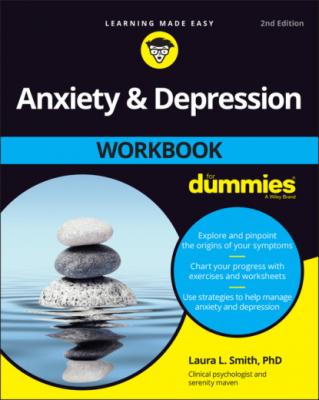Anxiety and Depression Workbook For Dummies. Laura L. Smith
Читать онлайн.| Название | Anxiety and Depression Workbook For Dummies |
|---|---|
| Автор произведения | Laura L. Smith |
| Жанр | Журналы |
| Серия | |
| Издательство | Журналы |
| Год выпуска | 0 |
| isbn | 9781119867449 |
If you have access to family members, ask if they’d be willing to talk with you about your family’s history. Ask them if any relatives, from either side of the family, suffered from symptoms of anxiety or depression. You may want to review the symptoms covered in Chapter 1 first. There’s no exact number of relatives required for determining if genetics are responsible for your symptoms. However, the more family members sharing similar problems, the more likely you’ve inherited a tendency for symptoms of depression or anxiety. Fill in the in blanks with notes about what you learn (Worksheet 2-1).
| Members of my family with anxiety or depression (brothers, sisters, cousins, parents, uncles, aunts, and grandparents): |
In addition to genetics, depression and anxiety can have biological underpinnings in the drugs you take (legal or illegal) or as the result of physical illness or injury. Drugs, whether over-the-counter, prescription, or illegal, have many side effects. Sometimes solving your problem is as simple as checking your medicine cabinet for possible culprits.
In addition, alcohol is widely known to contribute to depression or anxiety when it’s abused. Some people find that even moderate amounts of alcohol exacerbate their problems with mood. Alcohol also interacts with a variety of prescribed and over-the-counter drugs to produce harmful and even deadly results.
Finally, illegal drugs such as cocaine, heroin, methamphetamine, ecstasy, and so on are sometimes taken to alter moods. In the short run, they accomplish that goal; but in the long run, they almost inevitably worsen mood problems.
Marijuana, legal in many states, has strong psychoactive qualities. Some people use marijuana to alleviate emotional distress and anecdotally report success. A few early studies suggest that for depressed and anxious people, cannabis may improve moods and decrease anxiety. However, empirical research studies have not been widely conducted to verify its usefulness for this purpose.
Physical illnesses or injuries (especially head trauma) can also produce symptoms of anxiety or depression. Not only can the illness itself cause mood problems, but worry and grief about illness or injury can contribute to your distress. If you’ve been diagnosed with a medical condition, check with your doctor to see if your depression or anxiety is related to that condition. Jot down any possible physical reasons for your anxiety or depression in Worksheet 2-2.
Worksheet 2-2 Physical Possibilities
Plotting Out a Lifeline
The sadness and angst you feel today may have sprouted from seeds planted in your past. Therefore, exploring your personal history provides clues about the possible origins of your problems. The exercise in this section, called the Emotional Origins form, takes a little time.
The Emotional Origins exercise makes you revisit your childhood by asking questions about your parents or other caregivers and your childhood experiences. Some of the memories involved may evoke powerful emotions; if you start to feel overwhelmed, you may want to stop the exercise and consult a mental health professional for guidance and support.
Filling out this form is a lot easier after you look over an example. Here’s an example of how Tyler filled out his Emotional Origins form.
Worksheet 2-3 Tyler’s Emotional Origins
|
Questions About Your Caregivers
1. Who were the primary caregivers in my childhood, and what were they like? Describe their personalities.
My mother was self-centered and rarely thought much about what my sister and I needed. When things didn’t go her way, she exploded. She was domineering and incredibly uptight. She was a perfectionist who talked about the “right way” or the “wrong way” to do things. I also remember that she always acted like a martyr.
Everyone liked my dad because he was funny and friendly. But I don’t really remember him joking that much with me. He mainly criticized me because I was clumsy and didn’t like to go hunting with him.
My parents divorced when I was 11 years old. When I was in high school, my mother had a boyfriend who lived with us. He was nice, but we really didn’t hit it off. I think I was sort of jealous of the attention my mother gave him.
2. How was love and affection expressed by each caregiver?
Neither of my parents ever said, “I love you,” and I can’t remember getting hugs from them. I always saw other families hug each other, and that made me feel awkward. As an adult, I still feel weird in social situations when people greet each other with hugs. My mother would tell other people how much she loved her kids, but it seemed like she was talking about some other kids, not my sister and me. She wanted everyone to think that she was the perfect mother, wife, and homemaker. It was all about her.
Like I said before, my father was friendlier to other people than to me. He seemed to care about himself more than his family. I never said “I love you” to either of my parents. Now they’ve both passed away, and I feel guilty that I never said those words to them. I do realize why it was so hard for me to tell them when they never told me either.
3.
|
